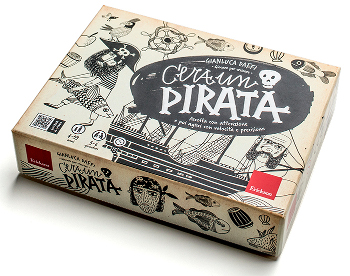 EN
EN
 PT
PT

“There was a pirate… sitting on a wooden barrel, with a green fish on his head. That’s how one of the many challenges of this fun game begins.
Did you listen carefully to all the details? Stand by to board: pick up all your cards quickly, beat your opponents and build the totem!
THERE WAS A PIRATE is a game in the «Playing to grow» series, conceived by Gianluca Daffi, a university lecturer and expert in childhood and adolescent psychology.
Each game focuses on a specific executive function or cognitive process with the aim of developing it whilst having fun.
THERE WAS A PIRATE specifically develops working memory, attention and listening, and planning

HOW TO PLAY

Preparation
Spread out the all the «Object» cards face-up on the table.
The barrel and the 10 «Totem» cards should be put in the middle face down
Each player receives a «Flag» board
Start of the first hand
End of the first hand
The first to complete the totem grabs the barrel and shouts «Stand to board!». The game leader who read/described the totem turns over the cards to check it is build correctly. If it is correct the player wins a gold nugget.
If the totem is wrong the player who shouted «Stand to board» has to pay a forfeit, putting 2 gold nuggets from their initial pile back. If the player hasn’t got any gold nuggets they accumulate debt, which has to be paid off as soon as they earn some gold.
The prize gold nugget will then go to the player who has the most correct cards, even if they haven’t completed their totem because they were interrupted by the shout of the other player. In the event of a tie between two or more players each one will receive a gold nugget. If no one has completed the totem you start a new hand.
End of the game
When the «Totem» cards run out, the player with the highest number of gold nuggets wins.
A GAME WHICH STIMULATES EXECUTIVE FUNCTIONS

What are executive functions?
Executive functions are the set of mental processes which monitor our thoughts and behaviours. They incorporate various neurological operations which are needed to control and coordinate our actions.
Put more plainly they are like a series of little gnomes who all work together in our brain, helping us execute any kind of task we might face in our daily lives.
FLEXIBILITY – In other words the ability to adapt to new situations and handle contingencies appropriately
PLANNING – In other words the ability to see yourself reaching an objective and understanding the steps to be taken to achieve it
FOCUSED ATTENTION – in other words the ability to concentrate on certain elements, selecting what is useful by “filtering” it from all the other information available
WORKING MEMORY – In other words the ability to remember information connected to the execution of an activity and the time needed to conclude said activity
RESPONSE INHIBITION – In other words the ability not to implement the first response we impulsively tend to produce, whether it is opportune or not
EMOTIONAL SELF-REGULATION – In other words the ability to handle your emotions and keep your feelings under control so they do not prevent you from reaching your goals